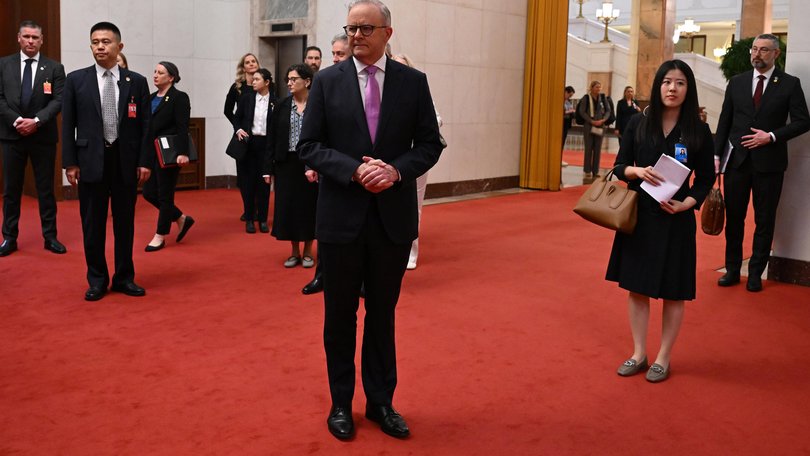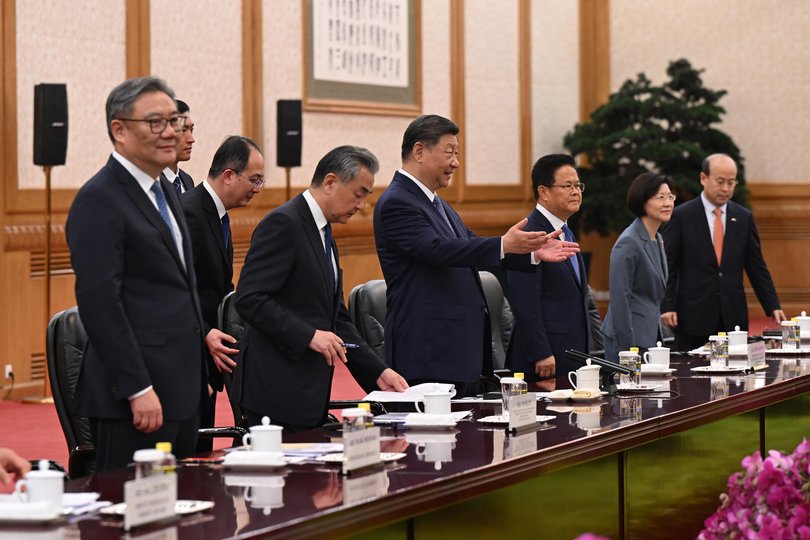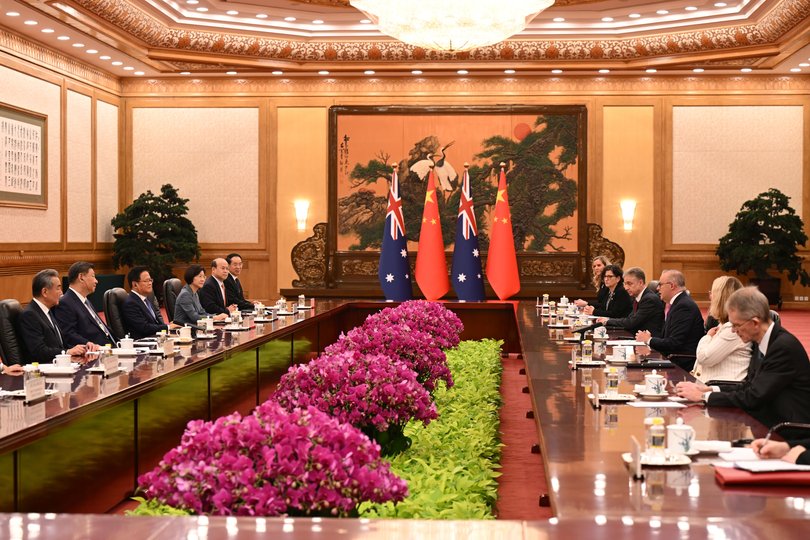NICOLA SMITH: When Albo met Xi: China rolls out the red carpet for PM
NICOLA SMITH: Anthony Albanese’s meeting with President Xi had an air of diplomatic nicety, but the PM did raise alarm over China’s military drills near Australian waters.

The Prime Minister has raised alarm over China’s military drills near Australian waters in a high-stakes meeting with the Chinese President that was dominated by discussion of lucrative trade ties.
However, the Chinese lease on the Port of Darwin, and increasing US pressure over tensions between China and Taiwan were not discussed, despite Mr Albanese’s vow not to shy away from contentious issues.
The PM said he had voiced concerns “about the notice and the ways that” the military exercises “happened, including the live fire exercises” during the meeting with Chinese President Xi Jinping.
Sign up to The Nightly's newsletters.
Get the first look at the digital newspaper, curated daily stories and breaking headlines delivered to your inbox.
By continuing you agree to our Terms and Privacy Policy.The Chinese naval fleet were seen in Australian waters in March while the Government only learned of the drills when a commercial airline pilot heard radio warnings mid-flight.
“President Xi said that China engages in exercises just as Australia engages in exercises,” said Mr Albanese but he insisted that he had stressed to the Chinese leader the need for “peace and security in the region.”
Mr Albanese said he also raised the case of detained Chinese-Australian writer Dr Yang Hengjun, who is jailed in China under espionage charges, but said “you wouldn’t expect there to be an immediate outcome”.
Not discussed
The ownership of the Port of Darwin was another issue was avoided in the meeting.
The Australian’s Government’s intention to strip the Chinese company of its 99-year lease of the strategic Northern Territory port has been criticised in Chinese media. When asked if he had discussed it with President Xi, Mr Albanese gave a blunt response: “No, it wasn’t raised.”
When asked if the Chinese President had raised concerns about US influence on Australia and its allies regarding Taiwan, Mr Albanese responded simply: “No.”
The Prime Minister said he had reaffirmed Australia’s longstanding position on Taiwan. Coalition frontbencher James Paterson said it would be inappropriate for the US to pressure Australia into committing to a specific role in any potential conflict.

Warm welcome
Beijing has made clear its intentions to leverage global frustrations with the upheaval of Donald Trump’s tariffs to push for closer economic integration with Australia, and it was on display as President Xi greeted Mr Albanese, praising the “mutually beneficial cooperation” of the two countries.
“No matter how the international landscape may evolve, we should uphold this overall direction unswervingly,” he said.
Mr Albanese was given a red carpet welcome and Mr Xi invited the PM and his fiancee Jodie Haydon for lunch.
The two leaders greeted each other warmly in an ornate chamber of the Great Hall of the People, built to impress foreign dignitaries.
“Ni hao,” was Mr Albanese’s hello in Chinese as he approached Mr Xi, who responded “welcome” through an interpreter.
“Wonderful to be here, Mr President,” replied Mr Albanese.
Trade ties
In a series of opening platitudes, the two leaders focused on economic cooperation.
The PM also emphasised the importance of the trade relationship compared to the United States.
“China is our major trading partner,” he said. “The destination for more than one in four of our export dollars comes here. The trade with the United States is important, but it’s less than 5 per cent what Australia is doing is engaging, not just with China, but we engage as well with our partners around the world, and we increasingly want to see a diversification of our trade.
As Mr Albanese prepared to meet with the Chinese leadership, one of China’s prominent state media The China Daily, praised his “friendly gesture” in undertaking his “notably long” tour that showed commitment to “deepening ties and fostering stability amid the uncertain global landscape”.
Against the backdrop of rising tensions with the US, “Albanese’s visit shows that the Australian side has a clearer judgement and understanding of China than it had under the previous Scott Morrison government,” said the influential newspaper. “Now, with the positive upturn in China-Australia relations, it is regarded as possible and desirable to restart the negotiations,” on upgrading the China-Australia Free Trade Agreement that were shelved by the Morrison government, it said.
As the leaders sat down opposite a long, polished table for public remarks, the air was filled with diplomatic niceties that reflected this message.
Mr Xi praised Mr Albanese for fostering stronger ties, highlighting “in depth discussions on the strategic overarching issues critical to the direction of China-Australia relations.”
The China-Australia relationship had risen from “setbacks” and turned around, he said.
“The most important thing we can learn from this is that a commitment to equal treatment, to seeking common ground while sharing differences, pursuing mutually beneficial cooperation, serves the fundamental interests of our two countries and two peoples,” Mr Xi added. The Chinese President recalled his 2014 visit to Australia and the establishment of a “comprehensive strategic partnership,” which was now entering a second decade.
“The Chinese side is ready to work with the Australian side to push the bilateral relationship further and make greater progress so as to bring better benefits to our two peoples,” he said.
Mr Albanese mirrored his host’s positive outlook, praising Chinese hospitality and stressing “dialogue needs to be at the centre of our relationship.”
The Prime Minister honed in on Mr Xi’s remarks about “seeking common ground while sharing differences,” underscoring that this had produced “very positive benefits” for both countries.
“I welcome the opportunity to set out Australia’s views and interests and our thinking on how we can maintain peace, security, stability and prosperity in our region,” he said.
In his own opening remarks, Mr Albanese highlighted Mr Xi’s visits to all states and territories in Australia, and said he was happy to reciprocate with his own trip to the three cities of Chengdu, Shanghai and Beijing this week.
He said he looked forward to his later meeting with Premier Li, notionally the Head of Government in China, which is expected to deliver any tangible outcomes agreed from the day’s schedule.
The Australian Government welcomed progress on cooperation under the China-Australia Free Trade Agreement, he said.

Business boon
The PM’s much-anticipated talks with the Chinese leadership is running parallel to the Australian-China CEO roundtable, drawing together business titans from resources, tourism, finance, education and agriculture, and which he will address on Tuesday evening.
Business Council of Australia chief executive Bran Black stressed the importance of engagement between top-level political leaders to “set the tone” at a business-to-business level. “Those business-to- business engagements in turn . . . send a bit of a signal to Australian businesses and to Chinese businesses that further engagement is welcome and further engagement should be encouraged,” he said.
Tuesday’s business event will be the first CEO-roundtable in Beijing featuring an Australian Prime Minister in nearly a decade, and the executives attending will present Mr Albanese and Mr Li with a series of recommendations on how to forge closer economic ties.
Businesses in both countries are keen to reset the bilateral economic relationship after a slump during a diplomatic spat between the two nations over the origins of the COVID pandemic that led to China slapping a series of import bans on Australia.
More than $20 billion of trade impediments have been lifted and last year the exchange of goods and services hit $312b.
Mr Black said Tuesday’s forum was an opportunity to explore a number of areas where trade cooperation could be enhanced in areas such as agribusiness, professional services, financial services, higher education and green metals.
“One in four Australian jobs is dependent upon trade,” he said, adding that as global trade lines were being redrawn, greater cooperation between Australia and China would help to “safeguard against some of the uncertainty we see in the world right now.”
“When you’re dealing with uncertainty, such as there is . . . we can really just control those things that are within our scope to control,” he said.
Although Australia was a small country it could also engage with the world at a bilateral and multilateral level to underscore the importance of free trade, Mr Black argued.

